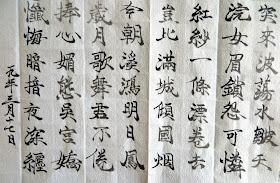
This poem was inspired by a photo posted on Facebook by a friend. For this, I have to thank him wholeheartedly.
I first saw it on the small screen of my phone. Lines describing the scenery were starting to form but unable to establish a theme.
Finally on the computer's large screen, I noticed a black dot in the sky and that the lake waters were not that mirror smooth. With a sudden insight as I expressed my thoughts out on paper, that within fifteen minutes a theme was established and by the end of the hour, the language was polished. I was delighted.
此詩靈感來自臉書朋友發布的照片。為此要向他感謝萬分。
首次之見於手机小屏幕上。景句開始形成但主題難現。
終於在電腦大屏幕上, 注意到天空中一點烏斑而且湖水并非滑如鏡。紙上思維洞見一閃突發, 十五分鐘之內主題已立, 而一鐘頭後, 言語花開。愉悅交加。
...
波微湖靜烟鎖白 Shrouded in misty white are gentle ripples on a quiet lake,
獨飛孤雁墨點黑 And a lonely swan flying in dotted black.
音盡丹青紅塵別 All sounds had ceased and colors to this place of red dust adieu bade,
九霄仙子人間客 Ninth Heaven Fairy, but a guest in this world of mortals.
Note: "red dust" means "the mundane world".
19 March 2019
19 Jun 2020 - Update
瑤池仙客 Jasper Pool Fairy
獨雁高飛點蒼黑 A soaring goose in loneliness, freckling the greyish sky black,
丹青紅塵景色去 The colors of the painted world are vanishing,
瑤池仙子音盡客 And when the sounds are gone, Jasper Pool Fairy is but a guest.
銀河流星莫久永 Shooting Stars in the Milky Way are never lasting,
金風玉露無幾刻 Not many moments are left for the Jade Dew of the Golden Winds.
醉夢不緣作醒人 Why would inebriated dreams a sober man be?
曉覺只恐春光隔 For in conscious trepidation that springtime had long said goodbye.









